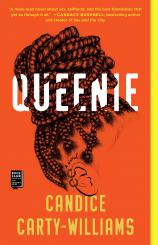Queenie
Review
Queenie
Candice Carty-Williams’ debut novel is garnering a lot of comparisons to Helen Fielding’s BRIDGET JONES’S DIARY, which on one level is apt. The title character is in her mid-20s, abruptly, unhappily single, and trying to keep her head above water (with the help of a handful of girlfriends) while making poor romantic and professional choices. But although QUEENIE is at times very funny, it’s overall much darker than Bridget Jones’ story, as Queenie engages in far more self-destructive behaviors than eating a carton of ice cream and watching Pride and Prejudice on endless repeat.
Queenie’s story also introduces elements of race, class and culture to the conversation. Queenie is a black woman living in London, one who grew up accused of being “white on the inside and black on the outside like a coconut” and who, as an adult, has dated almost exclusively white men. Her Jamaican heritage and her race help define who she is, and she’s passionate about issues like intersectional feminism and the #BlackLivesMatter movement; her desire to write about political issues is one of the reasons she took an entry-level job at a magazine. Instead, however, she finds herself the literal poster child --- along with a couple of Asian employees from other departments --- for diversity at her almost all-white employer.
"Despite its moments of real bleakness, QUEENIE does bear many of the markings of a present-day romantic comedy. But in this case, the object of Queenie’s hard-won affection is herself, in all her complexities and imperfections."
The opening sets the tone for the entire novel. Queenie learns that she got pregnant despite having an IUD --- what’s more, she’s miscarried. The depth of her emotional response surprises herself, even though her grief is likely intensified by the fact that her longtime boyfriend Tom, with whom she shared a flat, has asked to take a three-month “break.” Bolstered (and often chided) by a group text with her three best friends (whom she nicknames “The Corgis” because they support the Queen), Queenie overcompensates for Tom’s absence by engaging in risky sexual encounters with men (including married men and a co-worker) who see her only as a voluptuous body, not as a person with intrinsic value. Is it any wonder that Queenie starts to see herself that way as well?
Queenie’s crisis of self-confidence coincides with self-destructive behaviors at work, as well as lingering resentment toward her own mother, who for too long was involved in an abusive relationship, often at Queenie’s expense. Her eventual desire to go to counseling after escalating anxiety and panic attacks also requires bravery, since her immigrant grandparents are deeply distrustful of seeking psychological help outside the context of the family.
Despite its moments of real bleakness, QUEENIE does bear many of the markings of a present-day romantic comedy. But in this case, the object of Queenie’s hard-won affection is herself, in all her complexities and imperfections.
Reviewed by Norah Piehl on March 22, 2019
Queenie
- Publication Date: November 5, 2019
- Genres: Fiction, Women's Fiction
- Paperback: 352 pages
- Publisher: Gallery/Scout Press
- ISBN-10: 1501196022
- ISBN-13: 9781501196027




